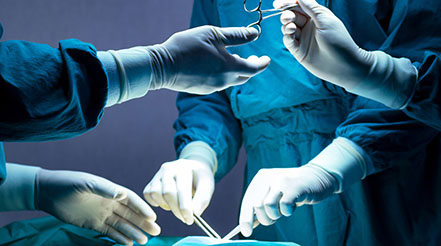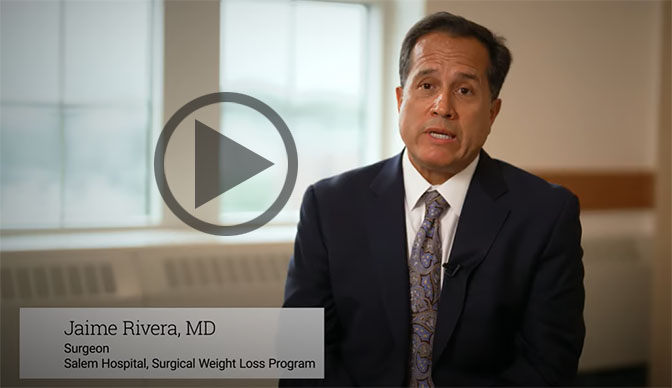Deciding to have surgery
Weight loss surgery is a tool to help you lose weight, but it will not do it all. For long-term success, patients must make changes to their eating and exercise habits, and possibly other shifts in habits and lifestyle. During the comprehensive evaluation you will be able to discuss all questions and concerns with your medical team. Based on the results of the evaluation, you will decide together with your surgeon the most appropriate approach and procedure.
Learn more and get started
What should I keep in mind as I consider weight loss surgery?
For patients with severe obesity, weight loss surgery is often the most effective way to achieve significant long-term weight loss. However, it is nonetheless important for any patient to exhaust all medical approaches to weight loss through diet and exercise first. Surgery should only be considered by those whose weight is high enough that the health risks are significant.
Qualifying for weight loss surgery
Weight loss surgery eligibility
What are the risks and benefits of each of the surgical procedures?
We have been recognized as a Level 1A Bariatric Surgery Center by the Metabolic and Bariatric Surgery Accreditation and Quality Improvement Program (MBSAQIP), the highest level of accreditation awarded by the American College of Surgeons, for the safety and quality of our program.
Benefits and risks of weight loss surgery
What lifestyle changes will I need to make after surgery?
Gastric bypass and sleeve gastrectomy permanently change the size of your stomach and cannot be reversed. In addition, gastric bypass permanently changes your digestive process, preventing the full absorption of nutrients, vitamins and minerals. Your diet after any of the surgical procedures will be radically different. For example:
- You will need to take vitamin and calcium supplements for life.
- Your new stomach will only hold one to three ounces, and you will only be able to eat as much as a small child.
- There will be food that you will not be able to tolerate, and you will have to have to eat very slowly and chew your food completely.
- You will need to avoid carbonated, caffeinated and alcoholic beverages as they will irritate your new stomach.
- Your diet will concentrate on protein, fiber and vegetables and there will be foods that you will need to stay away from, like high fat or high sugar foods. Fortunately, many patients report that their cravings for certain foods change over time.
- You will need to incorporate exercise into your life to achieve your desired weight loss.
Why is it important to incorporate exercise into my lifestyle?
To achieve maximum weight loss, skin and muscle tone, you will need to incorporate exercise into your new routine. Exercising will improve your cardiovascular fitness and build muscle mass, which will help you burn more calories. After surgery, your body will be under stress trying to adjust to the limited calories you can consume. If muscle is not regularly used for exercise every day, it will be consumed to meet your energy needs.
All patients in our surgical weight management program participate in our comprehensive post-operative nutrition and exercise program. We can help you with strategies for motivation and suggestions for trying a variety of exercise. As you lose weight, exercise will become easier and you may even discover that you enjoy it.
Will I need to postpone pregnancy after surgery?
Because your body will be going through rapid weight loss and changes, it is critical that you postpone pregnancy for at least two years after surgery so that you can obtain the proper nutrition to support a growing fetus.
Will my insurance company cover weight loss surgery?
Weight loss surgery is seen as an elective surgery by insurance companies. Each insurance policy is different and you should check with your company to see if it has elected to provide coverage for bariatric surgery before you schedule an appointment with a surgeon. If you do have coverage, our staff will help you provide the proper documentation to receive approval for surgery.
What are some of the emotional changes I may experience after surgery?
After weight loss surgery you will be adjusting to your new diet, exercising more, and learning what works and what doesn't. You may experience euphoria, excitement, joy, frustration, sadness, anxiety, anger, disappointment, and even a sense of loss about what used to be a major part of your life. All of these emotions are natural reactions and your support team can help you through them. Some things to bear in mind:
- You will need to find a new outlet for stress and a way to find comfort in something other than in food.
- You may find it difficult to be in social situations that revolve around eating.
- You may experience changes in relationships with family and friends.
Weight loss surgery is not a fix for your everyday problems with your spouse, friends, family, employment or social life. This surgery will allow you to begin to gain control over one aspect in your life: your weight.
Monthly Support Groups and Counseling:
In our monthly support groups patients draw strength from each other and benefit from ongoing education provided within the group. We also provide personal counseling with a professional experienced in working with patients who have had weight loss surgery. Learn more about our support groups
Why must I commit to the post-surgery program and life-long follow up with my surgeon and support team?
Weight loss surgery is a lifetime commitment to living a healthy life. As part of this commitment, you will be required to attend our comprehensive post-operative program for nutrition and exercise. This is a learning lab to give you the tools to change your behaviors and give you strategies for lifetime success.














